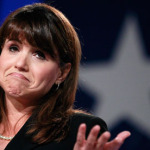 In this week’s Nation John Nichols asks, in “Incoherent Democrats,” how it is possible that voters could support progressive policies on refereda and then vote for Republicans who, in most cases, will stand opposed to those agenda items — as happened in Arkansas, Alaska, Nebraska, South Dakota, Massachusetts, Texas, and Wisconsin.
In this week’s Nation John Nichols asks, in “Incoherent Democrats,” how it is possible that voters could support progressive policies on refereda and then vote for Republicans who, in most cases, will stand opposed to those agenda items — as happened in Arkansas, Alaska, Nebraska, South Dakota, Massachusetts, Texas, and Wisconsin.
While voter suppression and low turnout are huge concerns that must be addressed, voters who came to the polls on November 4 were sufficiently progressive and populist to support minimum-wage hikes, paid sick leave, crackdowns on corporate abuses of the environment, expansion of healthcare and radical reform of a money-drenched campaign-finance system. They just didn’t elect Democrats.
How can that be? Nichols argues that
the root of the problem is a delinking of politics from policy. Increasingly, Democratic candidates in major contests run a “brands” carefully constrained to make a lowest-common-denominator appeal that is satisfying to campaign donors and insiders in Washington but that makes little sense to voters. While GOP candidates rage cynically against “elites” and “crony capitalism,” Democrats peddle pablum. As such, they don’t even excite their own base.
As I’ve said previously, I believe the Democrats don’t have an agenda that working people and the middle class can embrace, which is a problem.
It’s also true, however — and I know this from personal experience — that people often vote for whom they know or who is perceived as more like-able or the “nice guy.”
![]() I also know that campaign advisers sometimes encourage candidates not to take a stand on issues or not to be forthcoming about what they really think, lest they lose votes. When I was running, one person even told me I shouldn’t have a platform at all! Given that type of advice, it’s no surprise that many candidates don’t want to run on issues and instead focus on becoming a personal brand — and some are successful with that strategy.
I also know that campaign advisers sometimes encourage candidates not to take a stand on issues or not to be forthcoming about what they really think, lest they lose votes. When I was running, one person even told me I shouldn’t have a platform at all! Given that type of advice, it’s no surprise that many candidates don’t want to run on issues and instead focus on becoming a personal brand — and some are successful with that strategy.
The other problem is people viewing the parties as if they were ball teams: “It doesn’t matter what policy a person stands for; we just need more D’s in office! Go team D!!” From my perspective the goal is not to get more D’s elected; the point is to elect D’s who support a progressive agenda.
But my question about the Incoherent Democrat Paradox is this: Did voters vote Republican as a protest against Democrats? In other words, was the problem less Democrats not being excited enough to go to the polls, than it was people voting Republican to send the Democrats a message?
 I have long argued that many Democratic candidates don’t have a progressive agenda because they assume progressives are going to vote for them anyway, so why bother? The Christian Right has power because if Republican candidates don’t support a socially conservative agenda, right-wing Christians will not vote. The Tea Party has power because if Republicans don’t tow the line, Tea Party candidates will primary them. That doesn’t happen on the Left.
I have long argued that many Democratic candidates don’t have a progressive agenda because they assume progressives are going to vote for them anyway, so why bother? The Christian Right has power because if Republican candidates don’t support a socially conservative agenda, right-wing Christians will not vote. The Tea Party has power because if Republicans don’t tow the line, Tea Party candidates will primary them. That doesn’t happen on the Left.
 My problem with Ralph Nader was not that his supporters contributed to the election of George W. Bush. My problem with him was that he did not take credit for that. He didn’t say, “See what happens when you don’t have a progressive agenda?” Instead, he said, “It’s not my fault” and disappeared.
My problem with Ralph Nader was not that his supporters contributed to the election of George W. Bush. My problem with him was that he did not take credit for that. He didn’t say, “See what happens when you don’t have a progressive agenda?” Instead, he said, “It’s not my fault” and disappeared.
Perhaps the 2014 voters were sending a message to Democrats: Get a progressive agenda or we will vote Republican.